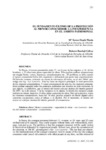El fundamento último de la protección al menor consumidor: la inexperiencia en el ámbito patronal

Ver/
Use este enlace para citar
http://hdl.handle.net/2183/2520Coleccións
Metadatos
Mostrar o rexistro completo do ítemTítulo
El fundamento último de la protección al menor consumidor: la inexperiencia en el ámbito patronalData
2007Cita bibliográfica
Anuario da Facultade de Dereito da Universidade de A Coruña, 2007, 11: 211-230 ISSN: 1138-039X
Resumo
[Resumen] En Roma, el menor consumidor entre 12 –en el caso de las mujeres- o 14 –de los
hombres- y 25 años tenía plena capacidad de obrar. Ellos podían realizar adquisiciones
sin ningún límite, ventas, hipotecas, arrendamientos etc... El problema se daba cuando
el menor consumidor había sido engañado o defraudado por gente más experimentada.
El Derecho romano, teniendo en cuenta la relevancia del tema, en el año 200aC promulga
una ley –Lex Laetoria-. Esta ley tiene un objetivo principal: la total protección
de los menores consumidores. Y como consecuencia de esta ley, los menores consumidores
podían cancelar todos los contratos realizados con terceros en todo momento, lo
que supone, en definitiva, que el interés del menor está por encima del interés general.
En 2007, no es lo mismo. Y la ley tampoco es la misma. En teoría los menores consumidores
no tienen, hasta los 18 años, plena capacidad de obrar. Pero en la práctica, todos
los menores consumidores, hasta los 18 años, pueden adquirir sin límite alguno salvo
concretas excepciones como el tabaco y el alcohol. Por el momento, el interés del
menor no está por encima del interés general: el consumismo. [Abstract] In Rome, the younger consumer between 12 –women- or 14 –men- and 25 years
old had total civil capacity. They could acquire without limit, sell without limit, mortgage,
rent and so on. The problem is that this younger consumer will be easily misled
or deceived or defrauded by experienced people. Roman Law, given the seriousness of
the situation, in 200 BC. promulgated a law –Lex Laetoria-. This law had one objective:
the total protection of the younger consumer. And by means of this law the younger
consumer could cancel old contracts with other people at any time, and the interest of younger people was over and above the general interest. In 2007, it’s not the same. The
law isn’t the same any more. Theoretically the younger consumer hasn’t got, before 18
years old, total civil capacity. But in practice, all young people, even before 18 years
old, acquire without limit save obvious exceptions such as tobacco and alcohol. At the
moment, the interest of young people isn’t over and above the general interest: consumerism
is.
Palabras chave
Menor consumidor
Capacidad de obrar
Lex Laetoria
Interés del menor consumidor
Consumismo
Younger consumer
Civil capacity
The interest of younger people
Consumerism
Capacidad de obrar
Lex Laetoria
Interés del menor consumidor
Consumismo
Younger consumer
Civil capacity
The interest of younger people
Consumerism
ISSN
1138-039X





